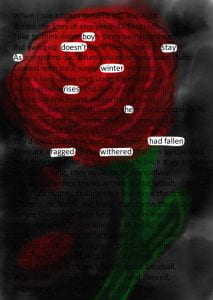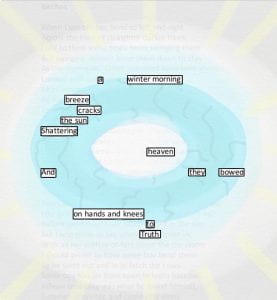You know when you’ve done a lesson so many times, it’s become muscle memory? You can just walk into class, set-it-up and then just go-! Poof! Wonderful lesson, wonderful class period, etc. etc. We all have those, right? Right?
I have been teaching this Robert Frost Unit for the last few years; a couple times in the UK and every year since I moved back to Ohio. I’m not an aficionado on Frost by any means, but I like that he’s an easy gateway to other 20thCentury American Poets. We can compare his traditional writing to other “traditional” poets, and contrast it to non-traditional poets like Ginsburg, Stein and Cummings.
Changing poems and approaches are not too difficult when there is a plethora of Frost texts to consider. However, each year, I seem struggle to tie in creative writing. It’s often set aside so we can analyze each piece (insert Billy Collins “Introduction to Poetry”) in order to prepare comparison and contrast. My students do get the option to write a Robert Frost Parody Poem, but few ever take me up on that.
Two years ago, after looking through the 2017-2018 Pages Anthology I noticed how many examples of black out poetry there were. An obvious popular piece or workshop that year! I’d remember doing something similar with essay writing and summarizing of YA chapters during my English Education Capstone, but had never experimented with it in my own teaching practice.
This is where the issue of muscle memory comes in; you can get bored. I was bored. Enter black out poetry. How do you do a black out poem when your original text is a poem? Was I over-complicating it? Would my students find it too difficult to create something that felt original with words that they’d already “beat [ ] with a hose”?
I took a step back and thought about last year and the poems they struggled with. Each year and even class period of the same year are so different. Ah-ha! “Birches”. It’s a beautiful poem, but there is a lot of detail spent in the figurative, and we usually end up having to split it up over two days, with group work and mini presentations.
This year, instead of doing any of that, we had a mini-lesson on black out poetry. Surely they had done it in another class. Nope! Excellent. After it was clear they knew what it was and how to do it, they opened up their RF Anthologies in their iPads and started reading and blacking out, circling, underlining what spoke to them. There was lots of hesitation, “am I do this right”s, but once they realized there were no wrong answers and it didn’t matter if they understood Frost’s words, I had 100% participating, fully focused for 25 minutes straight.
The next day we discussed and analyzed the poem, which took far less time than it ever had, with far fewer comprehension questions. Who knew approaching the poem in such a different way would make it so much more accessible!? You’d think after thirteen years of teaching I would have known that.
Sometimes you forget, when you’re relying on that muscle memory

